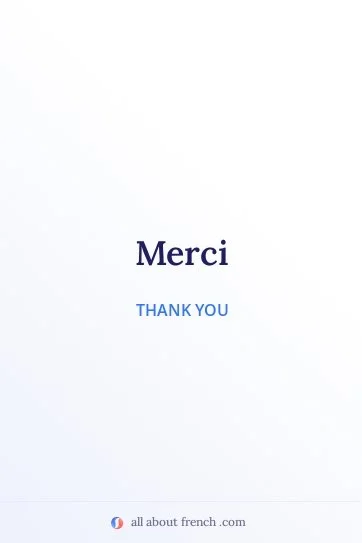
Are you ready to find out all the things you ever wanted to know about the basic French word "Merci"? Including a complete explanation of what it is and how to use it in a dialogue with an audio example. But that's not all, we also added useful informations like slow pronunciation audio, dialogue example, synonym and more!
Translation : Thank you
Register : Neutral - Basic
Slow
Normal
IPA : / mɛʁsi /

"Merci" is the most common way to say "Thank you" in French. In slang, it becomes "Cimer"
Use it exactly like "Thanks" in English, it's fine in every situation. So if you just want to learn the basics for now, no need for more. But if you want to sound like a French native, here are some tips:
→ If you want something more formal, use: "Merci à vous" or "Je vous remercie".
→ For the slang version, use: "Cimer"
→ And finally if you want to show extra gratitude, when a simple "Merci" isn't enough, use: "Merci beaucoup" (Thanks a lot) or "Un grand merci" (A big thanks)
(More details in the "Synonyms" section below)
Why is the slang version "Cimer" ? Simple! Take the syllables of the word "mer-ci" and reverse them → "ci-mer".
This mechanism is called "verlan" and is very common in slang contexts.
(The word "ver-lan" being itself a "verlan" of the word "à l'envers" which means "Reversed"...)
Normal gratitude:
Extra gratitude:
↓ Example in a story with French audio ↓
Finally, let's see an example in a parallel story with slow audio.
Le musée du Louvre
The Louvre museum
10%
The story just started!
Get full access to 365 texts and quizzes, including this one.
 Discover more
Discover more Already a member? Full story and quiz here.
